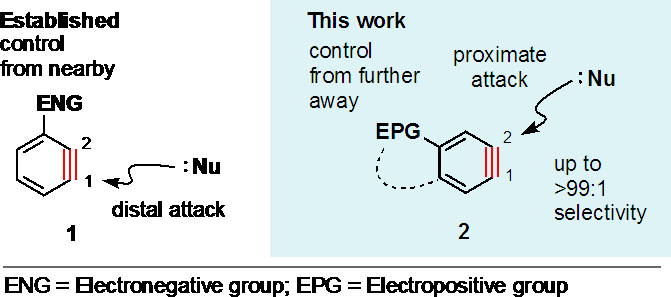Lecture: 'Remote Control Over Aryne Capture Regioselectivity'

Prof. Lukasz Pilarski
CiQUS Seminar room
12:15
Aryne intermediates can undergo a truly impressive range of transformations under mild conditions. This makes them exceptionally versatile intermediates in synthesis. The regioselectivity with which arynes react is most strongly and most often influenced by substituents directly next to the aryne triple bond (e.g. 1). However, few groups afford high levels of regioselectivity and almost all of these are electronegative (ENGs); leading to nucleophilic attack at the C1 position (distal with respect to the substituent). Directing nucleophiles to C2 using more remote and more versatile substituents has been the subject of several projects in our group.
We have developed an alternative approach to aryne regiocontrol using tuned electropositive groups (EPG) positioned further away on the aryne ring, able to direct nucleophiles to C2 with exceptionally high levels of selectivity (up to >99:1). This offers new opportunity for controling arynes and decorating their derivatives. The scope and underlying mechanistic understanding will be presented.
Biosketch
Lukasz Pilarski graduated with an MSci (2004) degree in chemistry from the University of Bristol. He obtained his PhD in 2009 from the group of Prof. Robin Bedford, specialising in the development of pincer and half-pincer organometallic complexes for various catalytic applciations. Lukasz then moved for a postdoctoral position to the group of Prof. David Cole- Hamilton at the University of St Andrews (2008-2009) to work unravelling the mechanism of some challenging Ru-catalyzed hydrogenations. A second postdoc (2009-2011) followed at Stockholm University in the group of Prof. Kálmán Szabó where he worked on C-H activation methodology based on allylic Pd(IV) intermediates. In 2012, Lukasz obtained a generous Young Researcher grant from the Swedish Research Council, allowing him to start an independent research group at Uppsala University. In 2016 Lukasz won the Thieme Chemistry Journal award and was promoted to Associate Senior Lecturer. His group’s research interests include C-H functionalization, aryne chemistry, boronate chemistry, organometallics and mechanochemistry.



